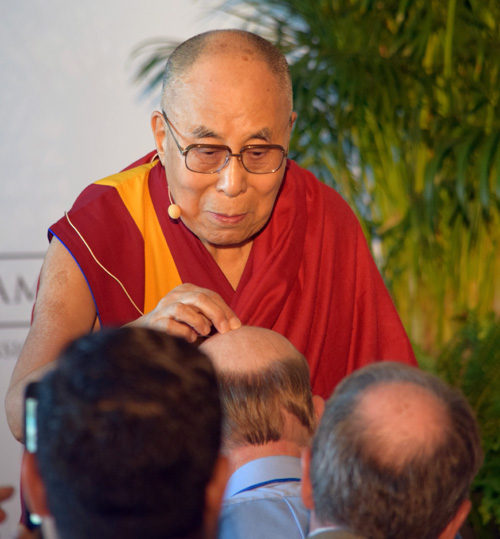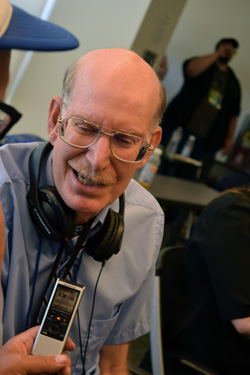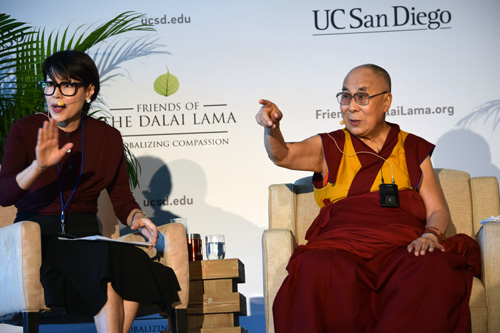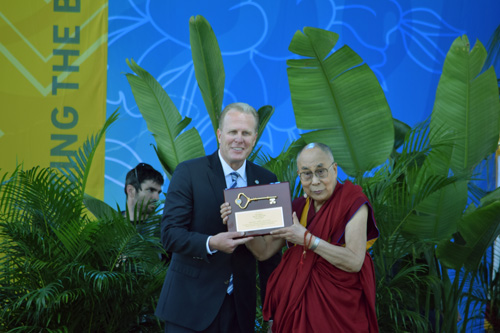
Story by Donald H. Harrison; photos by Shor M. Masori


LA JOLLA, California – Ken Stone, a Jewish community member who serves as a contributing editor to the Times of San Diego, figures he did two things right before covering the visit Friday of the Dalai Lama to UC San Diego.
First, he got a haircut on Thursday, and second, he arrived early enough on Friday to get a front row seat in the room where the Dalai Lama held a press conference. Tenzin Gyatso, the 14th Dalai Lama, shook hands with reporters sitting in the front row in the Recreation, Intramural and Athletic Complex (RIMAC) assembly room until he noticed Stone’s bald head.
Stopping in front of Stone, the Dalai Lama asked for permission to touch the journalist’s head and when Stone nodded his assent, the Dalai Lama made a tracing with his fingertips on the Stone dome as photographers in the back of the room clicked away.
“We are twins,” Stone commented.
“Yes, yes,” smiled the Dalai Lama as he headed for his position on the stage.
Reflecting on the brief incident later, Stone commented: “He saw my male pattern baldness, saw a fellow elderly gent – even though he is 81 and I am turning 63 on Sunday. I think he basically saw a kindred soul who he wanted to connect with, since he is living his creed of being a social person … He rubbed my head and I think he shook hands with me as well.”
Stone added: “I have to thank my haircutter, Maria, at the San Carlos Pizazz haircut station. I got my haircut yesterday so I could be presentable and I am glad that I did.”
Stone described the feeling of the Dalai Lama’s hand on his head “as warm, and longer than I expected. … I don’t recall him giving me a blessing, he just wanted to muss up my head. He actually rotated his hand around the bald spot, and that was an indication that he was not just touching me to say hi, but to feel my bald spot and share that commonality.”
The Dalai Lama likes to introduce himself as a “simple monk,” and Stone suggested that perhaps by pausing to rub his bald spot, the Dalai Lama was indicating that he’s “just a kidder like everyone else.”

Ann Curry, a former anchor for Dateline NBC and the Today show, assisted the Dalai Lama up steps to a seating area where he took questions from reporters. His opening statement at the news conference paralleled the beginning of his address later in which he emphasized compassion for our fellow human beings to an estimated 25,000 attendees sitting outside on the ball field.
He said that first and foremost he is one of the seven billion people residing on the planet, all of whom are “brothers and sisters.” Every one of these people, he said, have the right to a happy life. This could be facilitated, he said, if universities taught not only academic subjects, but also developed curricula to raise the level of compassion human beings feel for each other. “Somehow,” he said, “our education should try to strengthen this compassion.”
Asked his reaction to such an idea, UC San Diego Chancellor Pradeep Khosla said, through an aide, that “UC San Diego is creating an Institute of Practical Ethics. It will be a joint effort across campus led by Humanities.”
The second aspect of his identity, the Dalai Lama said, is that of being a Buddhist monk. In the 58 years he has lived in India, since fleeing at the age of 23 from Tibet under pressure from the Chinese government, he has become accustomed to being in a place of 1.1 billion people where all religions live together. “There are some problems here and there,” he said, but in India he has learned “it is possible to create genuine harmony, genuine respect.”
The Nobel Peace Prize winner said the third aspect of his identity was that of being a Tibetan. Some critics believe that he is a spokesman for Tibetan independence, but from such politics, he said, “in 2011, I totally retired,” dropping such a quest, and concentrating instead on the preservation of Tibetan culture.
UC San Diego students from China had announced their plans to protest the Dalai Lama’s visit and when asked about that, he said that this was not new, that similar protests have followed him many places. The protesters, he said, are unaware of the fact that he offers no opposition to the Chinese government in Beijing; is not a separatist and has not been since 1974; believes as Karl Marx did and the Chinese government does in the redistribution of wealth; and is principally concerned with promoting loving kindness and acceptance of others. He said there are some 400 million Buddhists living in China, many of whom show an interest in this philosophy.
In calling for universities to spend greater effort on educating people toward compassion, he said that the news media has a similar responsibility to promote compassion.

Later, at his outdoor address, where he was welcomed by UC San Diego Chancellor Pradeep Khosla and presented a symbolic key to the city by San Diego Mayor Kevin Faulconer, the Dalai Lama shared that personally he doesn’t like formality. “When we’re born, no formality; when we die, no formality,” he stated. When people take note of the fact that he is the Dalai Lama, he said, “there is only one and that creates loneliness.” His goal, he added, is “to try to promote universal compassion” and the “oneness of humanity.”
He said while the various cultures practiced by different segments of humanity are useful, “we should not put too much emphasis on that.” Such differences as nationality, color, faith, rich or poor, receive “too much emphasis,” he said. “We should keep identity without losing a sense of the oneness of humanity.”
The Dalai Lama said that a smile is unique to human beings—a beautiful thing—because a genuine smile is a sign of loving kindness. Loving kindness, he said, begets tolerance, which in turn can negate anger.
Curry read a question from a 93-year-old woman whose granddaughter will be at graduation ceremonies on Saturday, on which occasion the Dalai Lama also will speak. The woman wrote that she tells he family it’s up to them to leave the world a better place.
Before answering, the Dalai Lama said he wanted to show his respect to the elderly woman. He did so by tenting his hands in front of his face, and bowing slightly, rendering the traditional “Namaste” greeting.
Then he suggested that the mistakes of the 20th century cannot be changed. The future, on the other hand, can change. The woman’s granddaughter can be an agent of change. In the past, there was a tendency to resolve disagreements by force, which “is a total mistake,” he said. This century, the century of the woman’s granddaughter, he added, “should be a century of dialogue” in which opposing parties should respond to each other with “mutual respect and love.”
“It must be a century of dialogue for it to be a century of peace,” he said.
The Dalai Lama suggested, perhaps playfully, that to overcome suspicion and to initiate dialogue, perhaps the North Atlantic Treaty Organization (NATO) should move its headquarters to Moscow, “and relieve the Russian mind.”
Sometimes, he said, he likes to joke that if we met Jesus Christ, Muhammad, and Buddha and asked all three why there is no peace, they would respond, “Who do you think creates the violence? It is not God, it is you who have to solve this problem.” This was one of many statements by the Dalai Lama that brought forth applause from the audience.

Asked what can be done about hate speech and intolerance that one hears on campuses, he responded that “harsh words don’t benefit you,” and that all people “want to be happy, joyful. To create joyful individuals, we need friends—we are social animals. Friendship depends on trust. Show them a genuine smile, genuine respect.”
In an aside, he commented that animals too like smiles and appreciate our love.
“We should not become slaves of our narrow minds,” he declared.
*
Harrison is editor of San Diego Jewish World. He may be contacted via donald.harrison@sdjewishworld.com
Great story!